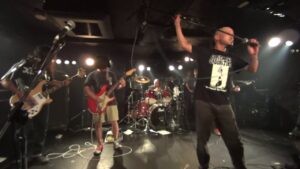Formation & Members
Lights Out (ライツアウト) emerged from the vibrant underground punk scene of Tokyo in 2002. The band was formed by a group of high school friends who shared a mutual love for raw, unfiltered music and a desire to create something that reflected their own experiences. The founding members included Takashi Yamamoto on vocals, Kenji Nakamura on guitar, Hiroshi Tanaka on bass, and Daichi Sato on drums. Each member brought a unique influence and energy, contributing to the band’s distinct sound that would soon resonate with fans both in Japan and internationally.
Over the years, the lineup saw some changes, with original bassist Hiroshi leaving in 2005, replaced by Yuki Matsuda, whose dynamic playing style added a fresh dimension to the band’s music. Despite these changes, the core of Lights Out remained true to its origins, with Takashi and Kenji continuing to drive the band’s creative force.
Musical Style & Characteristics
Lights Out’s musical style is a potent blend of traditional punk rock with hardcore elements, characterized by fast tempos, aggressive guitar riffs, and impassioned vocals. Their lyrics often touch on themes of societal disillusionment, personal struggle, and the quest for authenticity in a world increasingly dominated by superficiality. The band is known for their energetic live performances, where the raw intensity of their music is fully unleashed.
Influenced by both Western punk icons and Japanese punk pioneers, Lights Out crafts a sound that is both familiar and uniquely their own. Kenji Nakamura’s guitar work is particularly noteworthy for its precision and ferocity, while Takashi Yamamoto’s vocal delivery is both powerful and emotive, embodying the spirit of rebellion that defines the punk ethos.
Key Works & Discography
Over the years, Lights Out has released several albums and EPs that have cemented their place in the punk/hardcore scene. Their debut album, Breaking the Silence (2004), was a raw and unpolished introduction that captured the band’s youthful energy and potential. The album was well-received in underground circles and laid the groundwork for their future success.
Their sophomore effort, Unyielding Spirit (2007), saw the band refining their sound and expanding their lyrical themes. Tracks like “Echoes of Rebellion” and “No Turning Back” became anthems for fans, showcasing the band’s ability to blend melody with aggression.
In 2011, Lights Out released The Rising Dissent, an album that marked a turning point in their career. It featured more complex compositions and highlighted the band’s growth as musicians and songwriters. The album included standout tracks such as “Stormbreaker” and “Chains of Conformity,” which received critical acclaim and further solidified their reputation.
Their most recent album, Eternal Struggle (2018), continues to build on their legacy, with songs that reflect the current global climate and the band’s unwavering commitment to their message.
Influence on Other Bands/Scenes
Lights Out has had a considerable influence on both the Japanese punk scene and the broader international punk community. Their music has inspired a new generation of punk bands eager to carry the torch of defiance and individuality. Many emerging bands cite Lights Out as a major influence, pointing to their uncompromising approach and the authenticity of their sound.
Beyond their music, Lights Out’s DIY ethic and commitment to staying true to their roots have resonated with fans and musicians alike. They have been instrumental in fostering a sense of community within the punk scene, often collaborating with other bands and supporting up-and-coming artists through joint tours and split releases.
Breakups or Reunions
Despite the challenges that often lead to band breakups, Lights Out has managed to maintain their presence in the music scene with remarkable consistency. However, in 2015, the band announced a temporary hiatus, citing the need for a break and time to explore individual projects. This news was met with disappointment but understanding from fans who respected the band’s decision to prioritize their well-being and creative growth.
Fortunately, the hiatus was short-lived, and Lights Out reunited in 2017, returning with renewed energy and a reaffirmed dedication to their music. Their comeback was celebrated with a series of sold-out shows and the release of Eternal Struggle, marking a triumphant return to form.
Current Reputation & Legacy
Today, Lights Out is regarded as one of the stalwarts of the punk/hardcore scene, both in Japan and internationally. Their reputation is built on a foundation of authenticity, musical integrity, and an unwavering commitment to their principles. Fans continue to flock to their shows, drawn by the band’s passionate performances and the sense of community that surrounds their music.
As they continue to evolve and adapt to the changing music landscape, Lights Out remains true to their roots, using their platform to address social issues and inspire change. Their legacy is not only a testament to their music but also to their enduring influence on the punk community.
Conclusion
Lights Out (ライツアウト) stands as a beacon of authenticity and resilience in the punk/hardcore world. From their humble beginnings in Tokyo’s underground scene to their status as influential icons, the band’s journey is a testament to the power of music to transcend cultural and linguistic barriers. As they continue to create and perform, Lights Out’s legacy will undoubtedly inspire future generations of musicians and fans who seek to challenge the status quo and find their own voice in the world.









